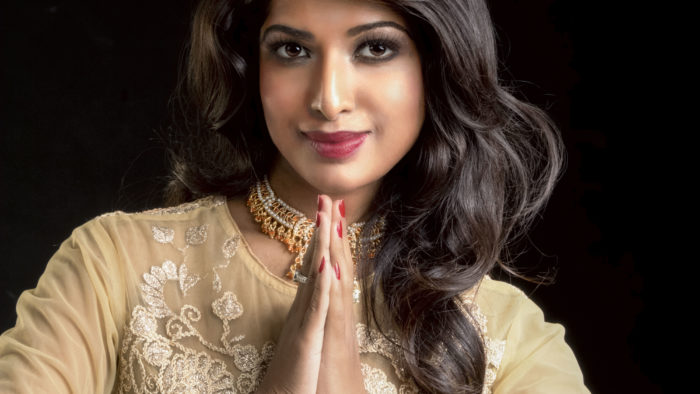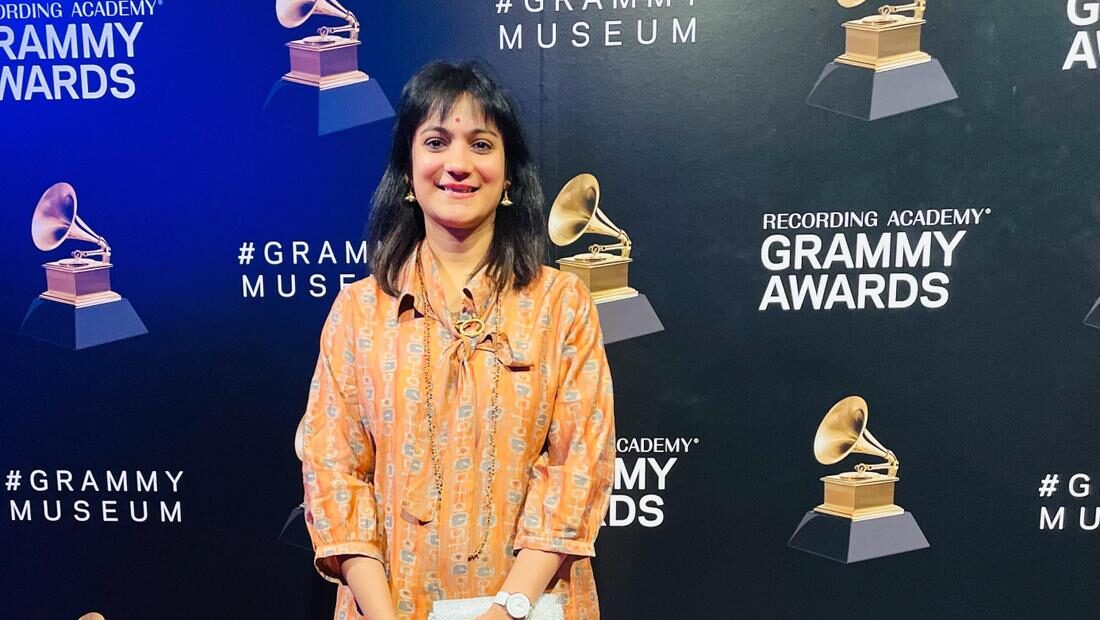Preity Üpala, a former Investment banker turned Multimedia Entrepreneur and Hollywood Producer holds dear the values of Sanathana Dharma. The former Miss India International talks about ancient Indian wisdom at her weekly spirituality radio show, “The Eternal Hour,” on I heart Radio and in her popular Youtube Channel called “The Preity Experience”. She has been to almost 100 countries and is currently developing a spirituaity focused international travel series. Her book, titled “The Eternal Gift“ is set to be published later in 2020.
As the Political Editor for The Observer, writing on Geo-politics, Conflict- resolution, Religion and Spirituality she has a keen interest in studying Soft Power. She is also a columnist for Jerusalem Post, Times of Israel. Her involvement with think tanks such as Observer Research Foundation and Centre for Indic Studies have helped sustain her lifelong interest in Sanatan Dharma, Vedic philosophy and the Science of Consciousness.
Preity was selected to receive an Honorary Doctorate from the prestigious Krishnamurty Institute in India. She lives in Los Angeles but travels all over the world for her work and spiritual pursuits. CSP interviewed her on her interests and her role as a ‘Dharmic Ambassador’.
You have worked and continue to wear many hats, what is the common thread among them?
I have been fortunate to have embarked on many adventures in my life whether it was Banking, Beauty pageants, Hollywood, Politics or Spirituality. The common thread among them is certainly my ‘Dharma’. I see my purpose in life as “empowering and inspiring people through my work and presence.
I have attempted to be the best I can and give the most I can as well. Ultimately I marry Spirituality and Globalization in any project that I undertake. It is part of my personal ‘Dharma’ to share knowledge with the world. By being an embodiment of Shakti herself and a conduit for this Ancient civilizational wisdom to permeate through the rest of the world.
How were the teachings of Sanathana Dharma imparted to you...by your parents or someone else?
I am very privileged to say that I had a very spiritual upbringing. Both my parents preserved and taught me our culture, traditions and philosophical concepts.
I grew up having the Ramayana and Mahabharata regularly narrated in their entirety by both my parents at almost all festivals and holidays.
I learnt true Yoga and Sadhana from my father who still gets up at 4 am every morning to do chanting and the Surya Namaskara to this day. I frequented temples my entire childhood and have been to many pilgrimages as well.
But it’s as an adult and on my own that I truly discovered the beauty and power of Santana Dharma. My own Spiritual path took me closer to my roots and lineage. In pursuit of my own truth, I have met many great Gurus and been initiated by them and learnt a lot of tools for self- actualization.
Which are your favourite people from India's sacred texts?
Interesting question! There are so many enigmatic and striking characters in all of the Hindu texts- whether it is the Vedas, Upanishads, Puranas or the Gita.
For a female character, I love all the goddesses, but my favorite has to be Kali. Kali is the feminist the world needs today. Goddess Kali is particularly fascinating. She is the quintessential embodiment of Shakti. This Hindu Goddess is an embodiment of boundless and existential freedom without seeking permission to be. She is both creation as well as destruction. Both frightening and awe-inspiring. Benevolent as well as destructive. Multi-faceted and unapologetic, she symbolizes Woman- ALL of her.
My favourite male character is of course Shiva. Mystical and piercing, he is the ultimate embodiment of power. He is fierce and unrelenting with the truth and I particularly connect with that.
In your day-to-day life what is the role of Sanathana Dharma
Santan Dharma plays a huge role in my life. The very idea of life and reason of existence comes from my faith.
On a mundane level, I try to live a Satvic life and be as light and pure as possible with my diet and lifestyle. Yoga, meditation, Ayurveda, fasting and Pranayama are a part of my routine and has had a profound effect on me.
On a much deeper level, I have learnt to ask myself these Eternal questions:
Who am I? Why am I here? Where am I going?
These are deeply imbued in my being, these are questions I have asked myself a lot throughout my life. Sanatan Dharma teaches us about ‘Maya’- the Illusion of life. When you understand this concept, you are not attached to anything and just enjoy life in the present moment, my understanding of Dharma keeps me on my mission and the path of why I’m here in the first place. My idea of Karma lets me keep trying hard, serving and to keep being the best I can be. And finally the idea of Moksha gives me the freedom of knowing that none of this matters and the only thing important in life is Spiritual development and ultimately liberation.
You have travelled all over the world.... what are the things that remind you of India in these different countries?
I have been lucky enough to travel to almost 100 countries. I like South- East Asia and I find this region particularly reminiscent of Indian culture and in particular Hindu heritage.
Bali, the famous tourist destination, is a Hindu island. And the national air carrier of Indonesia is Garuda, taken straight out of the Ramayana. They also have their own version of the Ramayana and even the Muslim population will learn about this great history. In Thailand, I found more shrines dedicated to Hindu deities like Lakshmi and Lord Indra than even for Gautama Buddha. I spent considerable time in Cambodia and may a day exploring Angkor wat- the largest temple in the world, which happens to be a Hindu temple.
In Singapore and Malaysia, the cuisine is heavily influenced by India and traditions like the Namaste are all prevalent all around Asia.
Even in Japan, the Hindu influence on Shintoism is deep. There is a particular reverence and appreciation of Hinduism and even India in Japan, which is pleasing to know. In all my travels, I must say that my experience has been overwhelmingly positive. Whether is it Dubai, or Rome I have encountered strangers having an appreciation for Indian culture. We are all interconnected in so many ways.
The Vedic saying ‘Vaisudevo Kutumbukam”- The entire world is one family holds true for me.
You are a commentator on Indo-US relations. What is the role that the Indian diaspora is playing in the US in dealing with Covid?
The Indian community in the US has really risen to the occasion during the COVID. One in every seven doctors in the US happens to be Indian and they have been at the very frontline of this pandemic.
But it’s not just the health care professionals. Many Hindu and Sikh charities have been running food banks or providing healthy fresh cooked meals to whomever may need it. The general American population do notice it.
I have always said that the US-India relation is an incredibly important one. This is a strategic alliance that really should be as strong as can be and is experiencing a positive reset. The world’s oldest Democracy and the world’s largest Democracy should work closely together and share the management of the Globe’s imperative issues. I see this relation being elevated more and will be the single most important alliance in the next few decades.
How can youngsters help in celebrating the diversity of India's culture throughout the world?
Young Sanatanis and Indians at large ought to be very proud of this incredible culture and rich tradition. They need to take back Yoga, Meditation, Pranayama and Ayurveda. A lot of the Vedic philosophy and Sciences are misappropriated and distorted and it is the youth’s task to correct this and fight back in a graceful way.
We need Sanatani students to be proud of their faith and culture and showcase it to the rest of the society.
In this year's Miss World contest, five countries had contestants of Indian origin. What role does beauty pageants play in promoting Indian culture or creating a new modern Indian culture?
Indian beauty is certainly a part of its Soft power. Since beauty pageant started, Indian girls have done incredibly well- we have some of the best records in terms of contestants winning or coming in the top three.
It showcases Indian beauty, which is very distinctive and like no other. In my experience of competing in and watching various pageants, there is an elegance, grace and dignity that you simply don’t get with anywhere else.
Pageants are not just about who has the prettiest face or the best body. It is about class, how you carry yourself, your eloquence, how feminine you are and thankfully these are given greater credence. I see these qualities being manifested in their highest elevation, in Indian women.
Also, typically contestants have a segment where they wear their traditional dress and a talent section where you have to showcase dancing or artistic skills resonant with your country. Here, Indian contestants have showcased our gorgeous sarees and traditional dancing, for everyone to appreciate.
Having won several pageants myself, although I don’t think much of this competitions but it does become a platform for women like myself to showcase the best of my culture.
Has India been able to harness her soft power adequately? What strategy would you recommend in packaging and marketing her better?
There is a famous verse in the Vedas, the oldest Holy Scriptures in the world, that say:
Ekam Sat Vipraha Buddha Vadanti, which translates to “Truth is one, the wise calls it by many names”.
This is the underlying ethos that defines India and one that we can teach the world.
It is remarkable that the oldest continuing, unbroken civilization in the world also happens to be the most populous. It has clearly stood the test of time and is clearly a framework that is sound in its foundation. There is so much India has taught the world and so much it will continue to teach the world moving forward.
I don’t believe that India has been able to harness its Soft power at all. Although we have arguably the most visible and rich Soft power in the world, we have not capitalized on this on this at all. Culture, food, dance, music can be even more elevated on the global level.
But more importantly than that, it’s the very essence and ethos of the culture and faith that is precious. It is needed in the world moving forward.
We are a civilization that has enough original thought and there is a deep reservoir of wisdom to draw from. We must find it within ourselves as citizens and as a nation to dig deep and proudly share it with the entire world.





